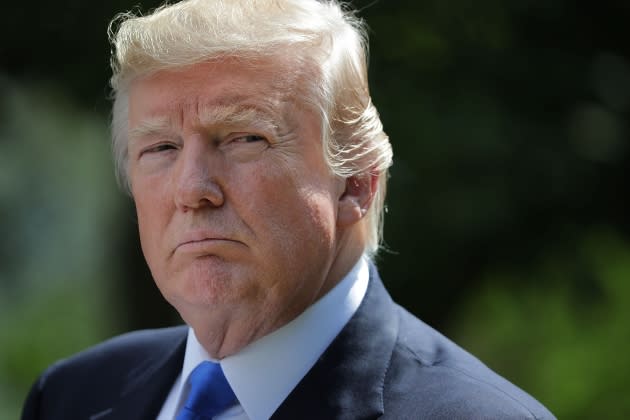Jan. 6 Committee Report Faults Trump for Provoking Capitol Attack
- Oops!Something went wrong.Please try again later.
- Oops!Something went wrong.Please try again later.

The House select committee investigating the Jan. 6, 2021, insurrection released its final report on Thursday, concluding that former President Trump intentionally spread false claims about the 2020 election and instigated his supporters to attack the U.S. Capitol.
The long-anticipated, 845-page eight-chapter report brings an end to an 18-month investigation during which the committee interviewed over 1,000 witnesses and conducted nearly a dozen public hearings.
More from Rolling Stone
Jan. 6 Testimony: Top Proud Boy Dishes on Beef With Oath Keepers
The Most Damning Things Jan. 6 Witnesses Have Said About Trump
Trump-Connected Lawyer Told Key Jan. 6 Witness to Lie to Committee
“As you read this report, please consider this: Vice President Pence, along with many of the appointed officials who surrounded Donald Trump, worked to defeat many of the worst parts of Trump’s plan to overturn the election,” committee Vice-Chair Rep. Liz Cheney (R-Wyo.) stated in the foreword to the report. “This was not a certainty. It is comforting to assume that the institutions of our Republic will always withstand those who try to defeat our Constitution from within. But our institutions are only strong when those who hold office are faithful to our Constitution.”
The report details a comprehensive overview of findings on how former President Donald Trump and his allies sought to overturn the 2020 presidential election. The document includes allegations that Trump actively worked to “transmit false Electoral College ballots to Congress and the National Archives” and ignored concerns among his legal team that doing so could be unlawful.
In its final hearing on Monday, the committee voted to make criminal referrals to the Justice Department against Trump on charges of obstruction an official proceeding, conspiracy to defraud the United States government, knowingly and willingly making a false statement to the federal government, and inciting, assisting, or engaging in insurrection. Several of Trump’s associates, including attorneys Rudy Giuliani and John Eastman, were also referred for criminal charges.
The committee also recommended the House Ethics Committee investigate four Republican House members, including House speaker hopeful Kevin McCarthy, as well as Reps. Jim Jordan (R-Ohio), Andy Biggs (R-Ariz.), and Scott Perry (R-Pa.), over their efforts to stonewall the committee’s work.
The Jan. 6 committee was conceived in May 2021 and initially intended to operate as a bi-cameral 9/11 Commission-style investigation into the events surrounding Jan. 6 and the effort to overturn the results of the 2020 election. The original structure of the committee was blocked by Senate Republicans, thus limiting its scope to a House investigation.
House Majority Leader Nancy Pelosi announced her initial appointments to the committee in July, 2021. Rep. Bennie Thompson (D-Miss.) was appointed chairman, and Republican Rep. Liz Cheney to serve as vice chair.
House Minority Leader Kevin McCarthy proposed five selections to the committee, Jim Banks (R-Ind.), Jim Jordan (R-Ohio), Rodney Davis (R-Ill.), Kelly Armstrong (R-N. Dak.), and Troy Nehls (R-Tex.). Banks and Jordan were rejected by Pelosi on grounds that their vote against Joe Biden’s certification as president-elect, as well as their participation to undermine election results in various states, would jeopardize the integrity of the investigation. In response, McCarthy withdrew all of his nominees from the committee. Pelosi ultimately selected Reps. Zoe Lofgren (D-Cal.), Pete Aguilar (D-Cal.), Stephanie Murphy (D-Fla.), Jamie Raskin (D-Md.), Elaine Luria (D-Va.), and Adam Kinzinger (R-Ill.) to serve on the committee.
Best of Rolling Stone
